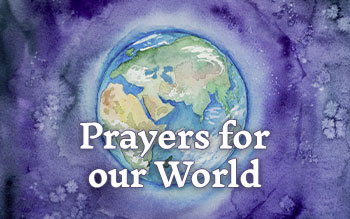Displaying items by tag: locusts
Kenya: locust storms
Locusts move like thick, dark clouds, tearing through parts of East Africa and devouring crop after crop, putting food supplies and farmers’ livelihoods at risk. These invasions aren’t new but they are happening more often than ever. ‘It is because of the change in climate’, said a satellite Information analyst in Nairobi. ‘Locusts that otherwise would have scattered for lack of vegetation to consume can now get lots of it’ Locusts invaded northern Kenya in January, devouring field crops, vegetables, cattle fodder and grazing land. Pray for organisations like Barnabas Fund who are assisting 1,000 vulnerable Christian families in the area. They aim to help subsistence farmers speedily restore their crop and livestock production, distributing seeds, fertiliser and appropriate pesticides to deal with locust eggs left in the soil and the surge in other pests that usually follow a locust swarm.
Kenya: bracing for locusts’ return
Kenya’s locust problem hasn’t gone away. In fact, Kenyans could see a third generation of the insects destroy vegetation across the country. This is the worst locust outbreak for the region in 70 years. Locusts have already caused a great deal of destruction in Kenya and surrounding countries this year. Favourable weather conditions could contribute to a return of the swarm. The last one found a route through the Rift Valley, the breadbasket of Kenya. They devastated everything that was green as they moved; they also left eggs to hatch later.
India: pandemic, heatwave, locusts
Delhi has 47.6oC temperatures and Churu in Rajasthan recorded 50oC in north India’s heatwave, which will last a few more days. The region also struggles with rising Covid-19 infections and swarms of locusts ravaging their crops. The temperatures are the highest India has seen in decades. Indian heatwaves in recent years have caused a number of deaths; there are no data yet on the impact of the current weather. Thousands of migrants are walking the highways after fleeing pandemic-ridden cities to try to return to their villages. Many have little food or water and will be among the most exposed to the sun and heat. In addition to that, the heatwave has affected efforts to combat the swarms of locusts. 100+ workers are using vehicle-mounted sprayers, pesticides and drones in the searing heat.
East Africa: triple tragedy
Torrential rains causing floods and landslides displaced 100,000 people and killed about 200 in Kenya. Floods destroyed 8,000 acres of crops, and the extreme rainfall will continue until the end of May. In Uganda, a river burst its banks, causing people to flee for safety. The waters of Lake Victoria have risen to unprecedented heights, forcing shoreline communities to abandon their homes. Rwanda, too, has seen houses, roads, and crops destroyed, and many killed by mudslides. At the same time, trillions of locusts have descended on the region. They can travel over 100 miles a day. There are 18 separate swarms in Kenya at present, and weather conditions are expected to favour breeding, so that a third generation could hatch in June and July. Added to these two tragedies, coronavirus is spreading among huge numbers of displaced people and closed borders are delaying delivery of pesticides to locust-affected areas.
Northern Uganda: a call for intercession
A missionary writes, ‘May we beg for your redoubled prayers as a “Double Whammy” threatens our communities. The Ugandan lockdown seems to be stemming Covid-19 and has just been extended for 21 days. Very tough on children; folk barely earning enough to eat; Sudanese refugees with 30% cut in rations and unable to plant more than a few vegetables; and the elderly with no one to help them. But many have spent lockdown in the fields, preparing to plant. Rains have begun and seeds are beginning to grow. This morning I rode my bicycle past fields of young beans and groundnuts. However, another threat hangs over us now. The locusts experienced in January have bred and millions of young are growing and devastating crops, trees, and cattle fodder. The military and everyone are concentrating on Covid-19. The locusts are spreading towards the huge refugee settlements and West Nile. Massive hunger could weaken the population, and we really wonder what might follow.’
East Africa: coronavirus in locust-infested regions
By 2 April, there were 5,999 recorded coronavirus cases in Africa. 374 were in East Africa, a region already severely impacted by a plague of locusts and a food security crisis. WHO warned that Africa must ‘wake up’ and ‘prepare for the worst’ against the coronavirus pandemic. The UN has warned of an impending food crisis in East Africa, and concern is growing for Christians in affected regions, many of whom already face marginalisation and persecution for their faith. Pray for all people in East Africa as they are doubly tested by the coronavirus outbreak and the terrible locust swarms. Ask God to meet their needs and may they be comforted in the knowledge of God’s love for them. South Sudan is currently virus-free; may it remain so.
East Africa faces new locust threat
The locusts are swiftly breeding and their numbers could increase 400-fold by June if the infestation is left unchecked, the UN has warned.
Countries in East Africa are racing against time to prevent new swarms of locusts wreaking havoc with crops and livelihoods after the worst infestation in generations.
A lack of expertise in controlling the pests is not their only problem: Kenya temporarily ran out of pesticides, Ethiopia needs more planes and Somalia and Yemen, torn by civil war, can't guarantee exterminators' safety.
Locust swarms have been recorded in the region since biblical times, but unusual weather patterns exacerbated by climate change have created ideal conditions for insect numbers to surge, scientists say.
Warmer seas are creating more rain, wakening dormant eggs, and cyclones that disperse the swarms are getting stronger and more frequent.
In Ethiopia the locusts have reached the fertile Rift Valley farmland and stripped grazing grounds in Kenya and Somalia. Swarms can travel up to 150 km (93 miles) a day and contain between 40-80 million locusts per square kilometre.
If left unchecked, the number of locusts in East Africa could explode 400-fold by June. That would devastate harvests in a region with more than 19 million hungry people, the U.N. Food and Agriculture Organization (FAO) has warned.
Uganda has deployed the military. Kenya has trained hundreds of youth cadets to spray. Lacking pesticides, some security forces in Somalia have shot anti-aircraft guns at swarms darkening the skies.
Everyone is racing the rains expected in March: the next generation of larvae is already wriggling from the ground, just as farmers plant their seeds.
"The second wave is coming," said Cyril Ferrand, FAO's head of resilience for Eastern Africa. "As crops are planted, locusts will eat everything."
The impact so far on agriculture, which generates about a third of East Africa's economic output, is unknown, but FAO is using satellite images to assess the damage, he said.
PESTICIDE SHORTAGES
This month, Kenya ran out of pesticide for about a week and a half, he said. Farmers watched helplessly as their families' crops were devoured. In Ethiopia, the government can only afford to rent four planes for aerial spraying, but it needs at least twice that number to contain the outbreak before harvesting begins in March, Zebdewos Salato, director of plant protection at the Ministry of Agriculture, told Reuters. "We are running out of time," he said.
Meanwhile, locusts - which have a life cycle of three months - are breeding. FAO says each generation is an average of 20 times more numerous. When eggs hatch, as they are doing now in northern Kenya, the hungry young locusts are earthbound for two weeks and more vulnerable to spraying than when they grow wings.
After that, they take to the air in swarms so dense they have forced aircraft to divert. A single square kilometre swarm can eat as much food in a day as 35,000 people. FAO said containing the plague will cost at least $138 million. So far, donors have pledged $52 million. Failure means more hunger in a region already battered by conflict and climate shocks.
Since 2016, there have been droughts in Kenya, Somalia, Ethiopia, then floods, Ferrand said. In South Sudan, more than half the population already faces food shortages.
By Omar Mohammed and Dawit Endeshaw
More at: https://news.trust.org/item/20200227122340-3t5r8
Pray: that sufficient resources, pesticides and planes will be made available to tackle this problem before it escalates or spreads further.
Pray: for a divine intervention that will stop the breeding and spread of these swarms in their tracks.
Pray: into this prophetic word from David Sseppuuya that these nations will seek repentance that will lead to restoration.
Pray: for the Church to rise up in these countries and to take a spiritual lead. (Joel 2:15-17)
2020 Global: Events needing prayer
Please call on the Lord for his intervention in the swarms of locusts that are growing and devouring farms in Africa, now spreading to the Middle East and China. (See). Pray for the hundreds of thousands forced to evacuate their homes after unusual flooding has devastated Australia, Southern USA, Bolivia, Peru, Indonesia and parts of the UK. (See) Over the past two months seismic activity has been rising. Last week a 7.7 quake struck off the coast of Jamaica shaking people as far away as Miami and Mount Merapi in Indonesia erupted launching lava and ash 2,000 metres into the sky, forcing residents to flee to a 1.8 mile designated no-go zone. (See) Pray for peace of mind for those living near seismic activity. Coronavirus infections continue to rise but less media coverage has been given to the highly contagious H1N1 virus that claimed 13 lives in one week in Taiwan (See)
Africa: locusts, drought, famine
Somalia has declared a national emergency as desert locusts destroy vegetation. An average swarm containing 40 million insects can travel 150 km in 24 hours, devouring enough food to feed 34 million people in that time. The UN said it is a race against time to tackle this invasion amidst ongoing humanitarian challenges. A spokesman said, ‘We do have a chance to nip this problem in the bud, but that’s not what we’re doing at the moment.’ Kenya’s food security is threatened, particularly communities keeping livestock on endangered pastures. Swarms crossed into Uganda on 9 February, and Tanzania and South Sudan are now on the UN’s ‘watch list’. Also, insufficient rain means that over two million Somalis will need emergency food aid this year after the worst harvest in 25 years. 300,000 were displaced in eight months; many have headed for the capital, Mogadishu. Six million Kenyans are food-insecure, while seven million Zimbabweans need aid after successive droughts and an inflation rate of 300%. Urban families are feeling the pinch of soaring prices. See








